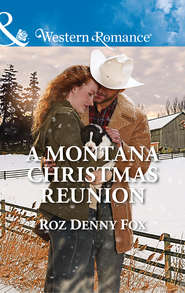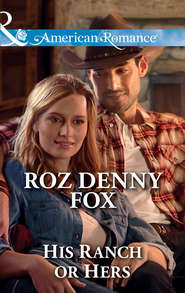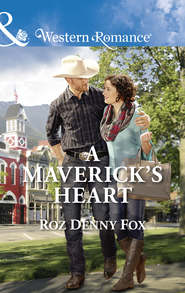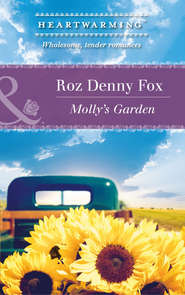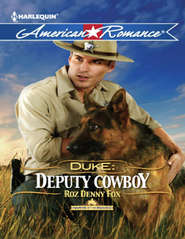По всем вопросам обращайтесь на: info@litportal.ru
(©) 2003-2024.
✖
The Maverick Returns
Автор
Год написания книги
2019
Настройки чтения
Размер шрифта
Высота строк
Поля
Willow stood Lily on her feet, then rose to glare at Coop. “Those meals weren’t that bad. And my sauces aren’t thin.”
“But you are. So I rest my case.”
Willow tossed her head. “Back when you took off for the rodeo, did I also tell you that you’re the bossiest person I’d ever met?”
“Not that I recall. I think I’m very reasonable.”
“Bossy! I’m not going to be your short-order cook, Coop. But since you were so kind as to fill my fridge and cupboards, pray tell me what your heart desires for your evening meal,” she said saucily.
He rolled his eyes. “I didn’t buy this stuff to make your life more difficult, Willow. You choose something out of what I bought. But please, put a little meat in whatever you fix.” He headed for the door, then stopped. “Uh, you haven’t become a vegetarian, have you? The way I remember it, you used to make a tasty pot roast. Oh, and burgers. Nice, fat ones.” He gathered up the empty grocery sacks and carried them to the screen door. Calling back over his shoulder, he said, “And meat loaf. You made a damn fine meat loaf, Willow.”
Willow wasn’t quick enough with a retort, though he probably wouldn’t have heard, anyway, as the screen door banged shut in his wake. She leaned a shoulder against the edge of the kitchen doorway. For several minutes she did nothing. It wasn’t until she shook herself alert that she realized she’d been smiling. Something she hadn’t done much of over the past several years. It felt unfamiliar. But good, too, she thought as she turned and saw that Lily had stacked the blocks in neat rows, not only by color, but with the letters all facing the refrigerator. Willow’s heart nearly burst with hope and pride and gratitude to Coop. Lord, he was a good man.
So, why did she want him to leave? Why did she feel such guilt over his landing on her doorstep? She had plenty of answers, but she needed to keep them to herself. Anything else would be unfair to the man she’d pushed out of her life five years ago.
Chapter Four
The back of Cooper’s pickup still needed to be unloaded. Feeling he’d made some headway in dealing with Willow, Coop whistled a decent rendition of Jimmy Buffett’s “Margaritaville.” It was a catchy tune he liked to pick out on his guitar—which was stashed behind the Ram’s backseat. Maybe he’d take it up to the porch tonight and play a little after supper. Willow and Lilybelle might like that.
While he was at the big-box store, he’d cruised through the book and magazine department, and spotted a health magazine containing a couple of articles on autism. He’d skimmed one to see if it’d give him any insight into Willow’s daughter. One article, written by a parent of an autistic boy, mentioned that he responded positively to piano tunes. The kid was quite a bit older than Lily; he owned a CD player and an iPod, on which his parents downloaded music for him. Coop bought the magazine, since he wanted to do more than just skim both articles. The other one was written by a neurologist, and it looked informative. He was trying to understand more about the illness. Or was it called a condition? A disorder? He wasn’t even sure what to call it. Not that Willow would welcome him sticking his nose into her family business. She used to be so open and talkative. Now she kept anything personal to herself. He’d had to drag the story on Tate out of her, even though it was common knowledge in town.
Thinking about Tate ruined Coop’s mood. Physical labor was the best for flushing any thoughts of that jerk right out of his mind.
He unloaded the hay bales, breaking a couple open and spreading them around the stalls in the barn where he’d stabled his horses. He filled a third one, where he’d bed down now that the old barn smelled better. Fresher.
Too bad he didn’t have access to a tractor so he could haul the feed sacks out to the feed troughs. Hoisting one up onto his shoulder and jogging it over to where the majority of the steers milled about, it occurred to him that when he’d finished this chore he might be too tired to eat. The work took him until late afternoon. The thought of having to repeat this every day until Willow’s cattle fattened up was almost enough to make him rethink staying around. No wonder Willow looked like a toothpick if she was the one who hauled hay to her herd. He had to hand it to her. She had grit.
Back at the pickup, he dusted off and eyed the sacks of seed he’d bought to resow the two main fields for fall. Was it even worth doing? A closer inspection of what passed for an irrigation system was discouraging. All the sprinkler heads were rusted or corroded, and a few were missing. And the job of spreading the seed, which—given the size of her fields—ought to take a matter of hours, would probably take days, thanks to the absence of a tractor and spreader. He’d seen a hand-broadcaster in the barn. Standing with his forearms draped on the side of the pickup bed, he recalled all the up-to-date equipment owned by the Triple D. Coop calculated the unlikelihood of Sully’s lending him a tractor, plow, spreader and harrow for a few days. Plus he’d need one of the Triple D’s flatbed trucks and trailers to bring it down here from Hondo. About a hundred miles each way. He slapped his hat against his thigh and snorted in disgust. It was a pipe dream. He’d have to apologize for socking Sullivan, if not actually grovel for leaving their ranch in the lurch for five years. Groveling didn’t come easy to him. And that punch to Sully’s jaw had been a long time coming.
Coop squinted into the waning sun. He wasn’t ready to swallow his pride and kiss Sully’s boots yet. It’d take more than a few days of backbreaking work to get him in that frame of mind.
He stacked the bags of seed outside the barn, rinsed out the bed of his truck, then took the hose around back, where he washed off the day’s grime and sweat. He had only two more clean sets of clothes in his duffel. He should have taken his laundry to town when he went. He’d seen Willow hanging their clothes on a line out back, so she must not own a dryer. He’d hunt up a Laundromat in the next day or so.
The smell of the evening meal wafting down to the barn reached Coop half an hour prior to the time Willow had told him his meals would be waiting for him. He knew before he tucked in his shirt, pulled on his boots and retrieved his guitar for the trek to the house that she was fixing her signature meat loaf… .
Coop had shared enough of the meals Willow had fixed for her father to identify the aroma. He’d hung out after school sometimes, talking rodeo with her dad. She almost never came to his house. They were three men living alone and her mom didn’t think it was proper.
Coop’s mouth was watering long before he bounded up the steps of Willow’s porch.
She was just setting out the covered plate on an orange crate next to the door.
“Oh, Cooper, here you are. I saw you packing a lot of feed out to the cattle. I was worried you’d be late and would have to eat reheated supper. Hey, let me bring out a chair so you can take a load off while you eat. You must be exhausted from everything you did today. Those feed sacks weigh a ton. It’s why I haven’t tried to fatten up the steers.”
Coop propped his guitar case against the porch railing. “The thought of a good meal brought me running, Willow. I’ve been tortured by the smell of your meat loaf from about the time it went into your oven. Tantalized is a better word,” he added quickly, catching the look of dismay that crossed her face.
“Here I figured I’d surprise you… .”
Coop picked up the plate and removed the cover. “It looks as delicious as I remember. And fresh peas in their pods. And cornbread. You exceeded my wildest expectations, Willow.”
She chuckled, and he noticed a dimple he remembered well, one he hadn’t seen since his arrival. All too fast, though, she blushed and retreated into the house.
“Wait,” he called, unable to stop himself. “Why don’t you bring out plates for you and Lily, too? We’ll call it a picnic.”
Willow didn’t respond immediately and Coop couldn’t see through the screen into the darkened house. But then she cracked it open and said, “Lily’s already eaten. She only likes a few foods right now.” Willow glanced away. “That’s part of her disorder. Some forms of autism have an obsessive component. For instance, she’ll like one food, one shirt, one pair of pajamas, and it’s a battle to get her to change. Today she dug in the dirt the whole time I weeded what’s left of my garden. That tired her out, so she ate, had her bath and crashed early. But I, um, suppose I can eat out here.” She glanced back when Coop said nothing. “Why the frown? Was the invitation only for the two of us?”
“What? Oh, no. It’s just that I brought my guitar with me tonight. I read something in a magazine about a boy with autism responding well to music. Not that I’m a great guitarist,” he pointed out. “And I know next to nothing about autism.”
“I wish I knew more. Every expert, every doctor and every therapist has a different theory,” she said. “But you used to be good enough on the guitar to play in that band during college. And, Coop, it’s thoughtful of you to think of Lily. She loves the blocks you bought. But I’d really like to hear you play for a while tonight.”
“Great, but please hurry and dish up your food. I can’t wait to dive into this while it’s hot.”
“Dig in. Don’t wait for me.” Willow was quick, however. And even at that, Coop had sampled everything on his plate before she returned to take a seat two steps below him. “I intended to get you a chair, but you seem to be doing all right without it. Be careful leaning against that post, though. I noticed some of them are rotting at the base. From the weather, I guess.”
Turning, he inspected the one at his back. “Looks like two or three posts and part of the foundation will need to be replaced before we can paint the place. I didn’t pick up any paint this trip, but I can get new boards and paint next time. You’ll need to go to town with me to choose a color.”
“Cooper.” Willow paused and shook her head, a forkful of food halfway to her mouth. “What part of I don’t have the money to make all these repairs or to cover the stuff you’ve already bought don’t you understand? I thought we already had this discussion.”
“This is the best meal I’ve had in weeks,” he said, ignoring her. “Is there any more cornbread? No, don’t get up. I’ll help myself. Is it in the oven or on the back of the stove?”
Вы ознакомились с фрагментом книги.
Приобретайте полный текст книги у нашего партнера:
Приобретайте полный текст книги у нашего партнера:






